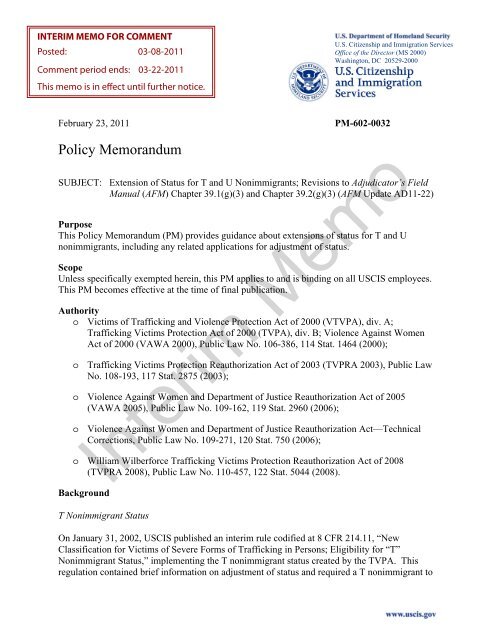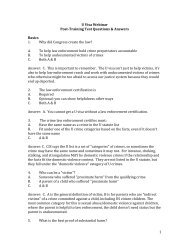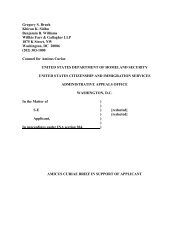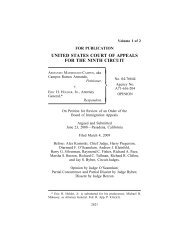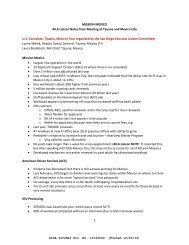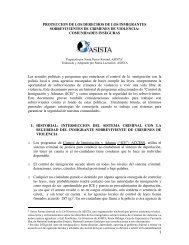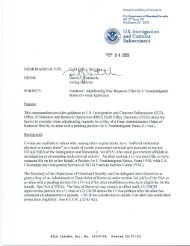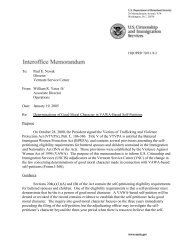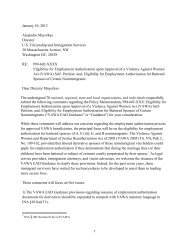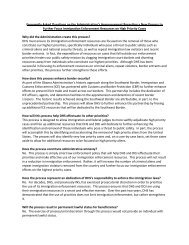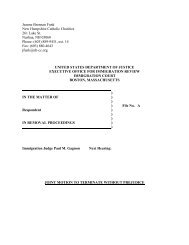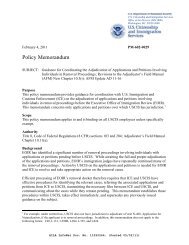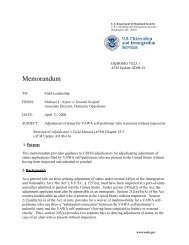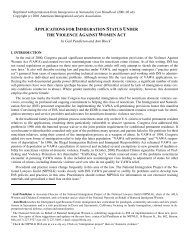Adjudicator's Field Manual (AFM) - asista
Adjudicator's Field Manual (AFM) - asista
Adjudicator's Field Manual (AFM) - asista
Create successful ePaper yourself
Turn your PDF publications into a flip-book with our unique Google optimized e-Paper software.
PM-602-0032: Extension of Status for T and U Nonimmigrants; Revisions to Adjudicator’s <strong>Field</strong><strong>Manual</strong> (<strong>AFM</strong>) Chapter 39.1(g)(3) and Chapter 39.2(g)(3) (<strong>AFM</strong> Update AD11-22)Page 4requirements to adjust status at 8 CFR 245.24. The adjustment of status of a derivative Unonimmigrant is not tied to the principal, so derivative U nonimmigrants are able to adjust statusas long as they meet the adjustment requirements at the time of filing. Specifically, derivative Unonimmigrants must have three years of continuous physical presence in the United States andbe in U nonimmigrant status at the time of filing. A derivative U nonimmigrant may need torequest an extension of derivative status to accrue sufficient continuous physical presence inderivative U nonimmigrant status before applying for adjustment of status.The TVPRA 2008 became effective on December 23, 2008. Section 201 of the TVPRA 2008amended the duration of status and extension provisions at INA § 214(p). Amended INA§ 214(p)(6) now provides that U nonimmigrant status may be extended if:The DHS Secretary determines that an extension of such period is warranted due toexceptional circumstances.Amended INA § 214(p)(6) now provides that USCIS must extend U nonimmigrant status in anyof the following circumstances:PolicyA Federal, State, or local law enforcement official, prosecutor, judge, or other Federal,State, or local authority investigating or prosecuting criminal activity certifies that thealien’s presence in the United States is required to assist in the investigation orprosecution of such criminal activity;During the pendency of an application for adjustment of status under INA § 245(m); orThe U nonimmigrant is eligible to apply for adjustment of status under INA § 245(m),but is unable to because regulations have not been issued to permit U nonimmigrants toadjust status.T NonimmigrantsDue to the complex changes to the statutory and regulatory requirements for T nonimmigrantstatus and related adjustment of status applications, this section on T nonimmigrants is dividedinto four categories with specific instructions for those applications that fall within each group.Interim MemoThe following information applies to T nonimmigrants afforded an extension of status during thependency of an application for adjustment of status:To receive an extension of T nonimmigrant status based on the filing of an application foradjustment of status, the T nonimmigrant should file the Form I-485, Application toRegister Permanent Residence or Adjust Status, with the Vermont Service Center. Thereis no need to file the Form I-539, Application to Extend/Change Nonimmigrant Status.
PM-602-0032: Extension of Status for T and U Nonimmigrants; Revisions to Adjudicator’s <strong>Field</strong><strong>Manual</strong> (<strong>AFM</strong>) Chapter 39.1(g)(3) and Chapter 39.2(g)(3) (<strong>AFM</strong> Update AD11-22)Page 5All adjustment of status applications will be adjudicated according to the T adjustmentregulation at 8 CFR 245.23.When a T nonimmigrant properly files for adjustment of status, USCIS will issue twonew Forms I-797, Notice of Action: a receipt notice for the application for adjustment ofstatus; and a notice of extension of the T nonimmigrant status.The extension of T nonimmigrant status will be valid until a decision is rendered on thepending Form I-485 and, during that time, the applicant will continue in valid Tnonimmigrant status with all the associated rights, privileges, and responsibilities.While the Form I-485 is pending, any Employment Authorization Document (EAD), aswell as renewals of such EAD, will be issued using the (c)(9) eligibility code.Derivative T nonimmigrants who properly file an application for adjustment of status willbe issued two new Forms I-797, as described above. Derivative T nonimmigrant statuswill not be extended based on the principal T nonimmigrant’s pending Form I-485.The following information applies to T nonimmigrants seeking an extension of status based onlaw enforcement need or exceptional circumstances:To request an extension of T nonimmigrant status based on law enforcement need orexceptional circumstances, the principal T nonimmigrant should file the Form I-539,Application to Extend/Change Nonimmigrant Status, along with supporting evidence,with the Vermont Service Center.If the principal T nonimmigrant wants the extension of status also to be applied to anyderivative T nonimmigrant family members, the principal should clearly indicate thatrequest in writing on the Form I-539.When a T nonimmigrant properly files a Form I-539, USCIS will issue two new FormsI-797, Notice of Action: a receipt notice for Form I-539 and, if the Form I-539 isapproved, a notice of extension of the T nonimmigrant status. This documentation willbe issued to any derivative T nonimmigrants indicated in writing on the Form I-539.The extension of T nonimmigrant status based on law enforcement need or exceptionalcircumstances will be valid for one year from the date the T nonimmigrant status did orwould end. During that period, the applicant will continue in valid T nonimmigrantstatus with all the associated rights, privileges, and responsibilities.Any Employment Authorization Document (EAD) (including renewals) will be issuedusing the (a)(16) eligibility code for principals and (c)(25) eligibility code for derivatives.Interim MemoGroup 1: Applicant Filed for Adjustment of Status While in T Nonimmigrant StatusUnder the T nonimmigrant regulations that were in effect before the adjustment regulations, aproper filing for adjustment of status must have been made within the 90 days preceding the thirdanniversary of the approval of the T nonimmigrant status. 8 CFR 214.11(p)(2) (2008). Those Tnonimmigrants who properly filed for adjustment of status in accordance with the previousregulations, even though they had accrued less than three years in T nonimmigrant status, willhave the Form I-485 adjudicated. Based on the proper filing made under old 8 CFR214.11(p)(2), these applicants are considered to continue in T nonimmigrant status until a final
PM-602-0032: Extension of Status for T and U Nonimmigrants; Revisions to Adjudicator’s <strong>Field</strong><strong>Manual</strong> (<strong>AFM</strong>) Chapter 39.1(g)(3) and Chapter 39.2(g)(3) (<strong>AFM</strong> Update AD11-22)Page 6decision is made on the application for adjustment of status. Because these T nonimmigrantsfiled their applications for adjustment of status prior to the adjustment regulations, adjudicatorsmay need to send a Request For Evidence (RFE) to request evidence required by the adjustmentregulation.Apart from those T nonimmigrants who filed in accordance with the filing instructions in old 8CFR 214.11(p)(2) (2008), USCIS will not accept early filings for adjustment of status fromprincipal T nonimmigrants with less than three years in T nonimmigrant status (except for thoseadjustment of status applications based on the exception at 8 CFR 245.23(a)(3) allowing forfiling before three years in T nonimmigrant status because an investigation or prosecution iscomplete). Any Form I-485 that is filed prior to the principal T nonimmigrant accruing threeyears in T nonimmigrant status (other than the exception) will be rejected as untimely filed.Group 2: Applicant Filed for Adjustment of Status After T Nonimmigrant Status Expired butBefore April 13, 2009The adjustment regulation allowed those applicants with expired T nonimmigrant status to filefor adjustment of status by April 13, 2009 (90 days from the effective date of the T adjustmentregulation). 8 CFR 245.23(a)(2)(ii).Those applicants in Group Two with expired T nonimmigrant status who properly filed a FormI-485 before April 13, 2009, are considered to continue in T nonimmigrant status until a finaldecision is made on the application for adjustment of status.Group 3: Applicant’s T Nonimmigrant Status Expired and Applicant Failed to File forAdjustment of Status Before April 13, 2009Those T nonimmigrants whose status has expired, but who did not file for adjustment of statusbefore April 13, 2009, should not have their T nonimmigrant status extended, unless they requestan extension based on law enforcement need or exceptional circumstances. See INA214(o)(7)(B)(i) and (iii). One of these extensions is necessary for the expired T nonimmigrant tobe eligible to file for adjustment of status.Interim MemoAs outlined above, to request either of these extensions, the T nonimmigrant files Form I-539along with supporting evidence. The nonimmigrant bears the burden of establishing eligibilityfor an extension. To establish law enforcement need, supporting evidence may include a newForm I-914 Supplement B, Declaration of Law Enforcement Officer for Victim of Trafficking inPersons, or other evidence from law enforcement. To establish exceptional circumstances,supporting evidence may include an applicant’s affirmative statement and any other credibleevidence to establish exceptional circumstances. If USCIS grants an extension of Tnonimmigrant status, USCIS will issue a new Form I-797 extension notice valid from the datethe previous status expired and for one year from approval of the extension. Once an applicantreceives this new Form I-797, they may then file Form I-485 to adjust their status to lawfulpermanent resident before the expiration of the extension.
PM-602-0032: Extension of Status for T and U Nonimmigrants; Revisions to Adjudicator’s <strong>Field</strong><strong>Manual</strong> (<strong>AFM</strong>) Chapter 39.1(g)(3) and Chapter 39.2(g)(3) (<strong>AFM</strong> Update AD11-22)Page 7One example of possible exceptional circumstances is if a principal T nonimmigrant’s status hasexpired and the approved derivative did not receive a T visa from a consulate and enter theUnited States before the expiration of the principal’s T nonimmigrant status. In the evidencesubmitted to establish exceptional circumstances, the principal should explain what exceptionalcircumstances prevented the derivatives from entering the United States. Once the extension isgranted and the derivatives enter the United States, then the principal and derivative Tnonimmigrants can file for adjustment of status.Group 4: Derivative Family MembersOnce a principal T nonimmigrant is no longer a T nonimmigrant, whether through adjustment ofstatus to legal permanent resident or through expiration of the T nonimmigrant status, anyderivative T nonimmigrants will no longer hold derivative T nonimmigrant status. For example,if a principal T nonimmigrant did not file for adjustment of status and his or her status laterexpired as a result, the status of any approved derivatives in the United States will also haveexpired and any approved derivatives abroad would not be eligible for admission into the UnitedStates on a T visa.To be eligible to apply for adjustment of status, a derivative T nonimmigrant must continue tohold T nonimmigrant status at the time of filing the application for adjustment of status. 8 CFR245.23(b)(2). Accordingly, derivative T nonimmigrants are encouraged to file for adjustment ofstatus concurrently with the principal T nonimmigrant to prevent expiration of the derivative Tnonimmigrant status and the resulting ineligibility for adjustment of status. A derivative Tnonimmigrant’s status will be automatically extended when the derivative properly files foradjustment of status.Where the approved derivative of a principal T nonimmigrant has not been issued a T visa by aconsulate and entered the United States and the principal’s nonimmigrant status is soon to expire,the principal is strongly encouraged to seek an extension of status based on exceptionalcircumstances, making sure to indicate on the Form I-539 that the extension should also beapplied to the derivatives, and then wait for the derivatives to enter the United States beforeapplying for adjustment of status. This step will prevent expiration of the derivative Tnonimmigrant status and the resulting ineligibility for adjustment of status.Interim MemoAs a last resort, upon a request in writing by the principal, USCIS would consider holding aprincipal’s application for adjustment of status if filed before the derivatives have entered theUnited States. However, principal T nonimmigrants are encouraged to request an extension of Tnonimmigrant status to prevent a derivative’s loss of eligibility for adjustment of status becausethe derivative did not enter the United States in valid T nonimmigrant status.
PM-602-0032: Extension of Status for T and U Nonimmigrants; Revisions to Adjudicator’s <strong>Field</strong><strong>Manual</strong> (<strong>AFM</strong>) Chapter 39.1(g)(3) and Chapter 39.2(g)(3) (<strong>AFM</strong> Update AD11-22)Page 8U NonimmigrantsThe following information applies to U nonimmigrants afforded an extension of status during thependency of an application for adjustment of status: To receive an extension of U nonimmigrant status based on the filing of an applicationfor adjustment of status, the U nonimmigrant should file the Form I-485, Application toRegister Permanent Residence or Adjust Status, with the Vermont Service Center. Thereis no need to file the Form I-539, Application to Extend/Change Nonimmigrant Status. All adjustment of status applications will be adjudicated according to the U adjustmentregulation at 8 CFR 245.24. When a U nonimmigrant properly files for adjustment of status, USCIS will issue twoForms I-797, Notice of Action: a receipt notice for the application for adjustment ofstatus and a notice of extension of the U nonimmigrant status. The extension of U nonimmigrant status will be valid until a decision is rendered on thepending Form I-485 and, during that time, the applicant will continue in valid Unonimmigrant status with all the associated rights, privileges, and responsibilities. While the Form I-485 is pending, any Employment Authorization Document (EAD)(including renewals) will be issued using the (c)(9) eligibility code. Derivative U nonimmigrants who properly file an application for adjustment of statuswill be issued two Forms I-797, as described above. Derivative U nonimmigrant statuswill not be extended based on the principal U nonimmigrant’s pending I-485.To be eligible to file for adjustment of status, a U nonimmigrant must be in valid Unonimmigrant status and may therefore require an extension of U nonimmigrant status. The INAallows for an extension of U nonimmigrant status based on law enforcement request or upon adetermination that the extension is warranted due to exceptional circumstances. INA§ 214(p)(6). The following information applies to U nonimmigrants seeking an extension ofstatus based on law enforcement request or exceptional circumstances: To request an extension of U nonimmigrant status based on law enforcement request orexceptional circumstances, the principal U nonimmigrant should file Form I-539,Application to Extend/Change Nonimmigrant Status, along with supporting evidence,with the Vermont Service Center. If the principal U nonimmigrant wants the extension of status also to be applied to anyderivative U nonimmigrant family members, the principal should clearly indicate thatrequest in writing on the Form I-539. When a U nonimmigrant properly files a Form I-539, USCIS will issue two Forms I-797,Notice of Action: a receipt notice for the Form I-539 and, if the Form I-539 is approved,a notice of extension of the U nonimmigrant status. This documentation will be issued toany derivative U nonimmigrants indicated in writing on the Form I-539. The extension of U nonimmigrant status based on law enforcement need or exceptionalcircumstances will be valid for one year from the date the U nonimmigrant status did orwould end. During such period, the applicant will continue in valid U nonimmigrantstatus with all the associated rights, privileges, and responsibilities.Interim Memo
PM-602-0032: Extension of Status for T and U Nonimmigrants; Revisions to Adjudicator’s <strong>Field</strong><strong>Manual</strong> (<strong>AFM</strong>) Chapter 39.1(g)(3) and Chapter 39.2(g)(3) (<strong>AFM</strong> Update AD11-22)Page 9Any Employment Authorization Document (EAD) (including renewals) will be issuedusing the (a)(19) eligibility code for principals and (a)(20) eligibility code for derivatives.The nonimmigrant bears the burden of establishing eligibility for an extension. In the case oflaw enforcement request, supporting evidence must include a new Form I-918 Supplement B, UNonimmigrant Status Certification. In the case of exceptional circumstances, an applicant maysubmit an affirmative statement and any other credible evidence to establish exceptionalcircumstances.U Nonimmigrant Derivative Family MembersOnce a principal U nonimmigrant is no longer a U nonimmigrant, whether through adjustment ofstatus to lawful permanent resident or through expiration of the U nonimmigrant status, anyderivative U nonimmigrants will no longer be eligible for admission into the United States on aU visa. For example, if a principal U nonimmigrant did not file for adjustment of status and hisor her status later expired as a result, any approved derivatives abroad would not be eligible foradmission into the United States on a U visa. After admission into the United States as aderivative U nonimmigrant, derivative status may be extended beyond the expiration of theprincipal nonimmigrant’s status to ensure the derivative will accrue at least three years in Unonimmigrant status for purposes of adjusting status. See PM 602-0001.To be eligible to apply for adjustment of status, a derivative U nonimmigrant must continue tohold U nonimmigrant status at the time of filing the application for adjustment of status. 8 CFR245.24(b)(2). Accordingly, derivative U nonimmigrants are encouraged to file for adjustment ofstatus concurrently with the principal U nonimmigrant to prevent expiration of the derivative Unonimmigrant status and the resulting ineligibility for adjustment of status. A derivative Unonimmigrant’s status will be automatically extended when the derivative properly files foradjustment of status.Where the approved derivative of a principal U nonimmigrant has not been issued a U visa by aconsulate and entered the United States and the principal’s nonimmigrant status is soon to expire,the principal can seek an extension of status based on exceptional circumstances, making sure toindicate on the Form I-539 that the extension should be applied to the derivatives as well, andthen wait for the derivatives to enter the United States before applying for adjustment of status.This step will prevent expiration of the derivative U nonimmigrant status and the resultingineligibility for admission into the United States. Alternatively, the principal U nonimmigrantcan file the Form I-929, Petition for Qualifying Family Member of a U-1 Nonimmigrant,concurrently or after approval of the principal’s Form I-485, for certain derivative familymembers who have never held derivative U nonimmigrant status. After approval of the FormI-929, the derivative can apply for a visa at a consulate to enter the United States as a legalpermanent resident.Interim MemoAs a last resort, upon a request in writing by the principal, USCIS would consider holding aprincipal’s application for adjustment of status if filed before the derivatives have entered theUnited States. However, principal U nonimmigrants are encouraged either to request an
PM-602-0032: Extension of Status for T and U Nonimmigrants; Revisions to Adjudicator’s <strong>Field</strong><strong>Manual</strong> (<strong>AFM</strong>) Chapter 39.1(g)(3) and Chapter 39.2(g)(3) (<strong>AFM</strong> Update AD11-22)Page 10extension of U nonimmigrant status or to file a Form I-929, as USCIS cannot guarantee it will beable to match the request to the adjustment application in time to postpone adjudication of theapplication.ImplementationThe Adjudicator’s <strong>Field</strong> <strong>Manual</strong> (<strong>AFM</strong>) is revised as follows:1. A new paragraph (g)(3) is added to Chapter 39.1 of the <strong>AFM</strong> to read:CHAPTER 39.1 U Nonimmigrants(g) Duration of U Nonimmigrant Status.(3) Procedures for Extension of Status(A) Filingo The extension of status based on the pendency of an application foradjustment of status is automatic when the applicant files Form I-485.o To request an extension of status based on law enforcement request orexceptional circumstances, the applicant files Form I-539.(B) Documentationo In general, when granting an extension of status, USCIS will issue a FormI-797, Notice of Action.o The applicant continues in valid U nonimmigrant status with all the rights,privileges, and responsibilities provided to a U nonimmigrant.o Extensions of status based on a pending application for adjustment ofstatus will be valid until USCIS makes a final decision on the applicationfor adjustment of status.Interim Memoo Extensions of status based on law enforcement request or exceptionalcircumstances will be valid for a period of one year beginning on the dateU nonimmigrant status did or would end.o Any EAD issued with the Form I-485 pending shall be issued using the(c)(9) eligibility code.o Any EAD issued with the Form I-539 shall be issued using the (a)(19) or(a)(20) eligibility code, as applicable.
PM-602-0032: Extension of Status for T and U Nonimmigrants; Revisions to Adjudicator’s <strong>Field</strong><strong>Manual</strong> (<strong>AFM</strong>) Chapter 39.1(g)(3) and Chapter 39.2(g)(3) (<strong>AFM</strong> Update AD11-22)Page 11o Derivatives who properly file Form I-485, or when a principal files a FormI-539 requesting extension for derivatives in writing, will also be issued aForm I-797 in the same manner as the principal.(C) Supporting evidence:o If seeking an extension of status due to a law enforcement need, anapplicant must submit a new Form I-918 Supplement B from lawenforcement certifying the presence of the U nonimmigrant isnecessary to assist in the investigation or prosecution of the qualifyingcriminal activity.o If seeking an extension of status due to exceptional circumstances, anapplicant may submit an affirmative statement and any other credibleevidence.2. A new paragraph (g)(3) is added to Chapter 39.2 of the <strong>AFM</strong> to read:Chapter 39.2 T Nonimmigrants(g) Duration of T Nonimmigrant Status.(3) Procedures for Extension of Status.(A) Filingo The extension of status based on the pendency of an application foradjustment of status is automatic when the applicant files Form I-485.o To request an extension of status based on law enforcement request orexceptional circumstances, the applicant files Form I-539.(B) Documentationo In general, when granting an extension of status, USCIS will issue a FormI-797, Notice of Action.Interim Memoo The applicant continues in valid T nonimmigrant status with all the rights,privileges, and responsibilities provided to a T nonimmigrant.o Extensions of status based on a pending application for adjustment ofstatus will be valid until USCIS makes a final decision on the applicationfor adjustment of status.
PM-602-0032: Extension of Status for T and U Nonimmigrants; Revisions to Adjudicator’s <strong>Field</strong><strong>Manual</strong> (<strong>AFM</strong>) Chapter 39.1(g)(3) and Chapter 39.2(g)(3) (<strong>AFM</strong> Update AD11-22)Page 12o Extensions of status based on exceptional circumstances or a lawenforcement need will be valid for a period of one year beginning on thedate the T nonimmigrant status did or would end.o Any EAD issued with the Form I-485 is pending shall be issued using the(c)(9) eligibility code.o Any EAD issued with the Form I-539 shall be issued using the (a)(19) or(a)(20) eligibility code, as applicable.o Derivatives who file Form I-485, or when a principal files a Form I-539requesting extension for derivatives in writing, will also be issued a FormI-797 in the same manner as the principal.(C) Supporting evidence:o If seeking an extension of status due to law enforcement need, anapplicant must submit a document from law enforcement, including a newForm I-914 Supplement B, certifying the presence of the T nonimmigrantis necessary to assist in the investigation or prosecution relating to humantrafficking.o If seeking an extension of status due to exceptional circumstances, anapplicant may submit an affirmative statement and any other credibleevidence.3. The <strong>AFM</strong> Transmittal Memoranda button is revised by adding, in numerical order,the following entry:AD 11-2202/23/2011Chapter 39.1(g)(3) andChapter 39.2(g)(3)Provides guidance regarding extensionsof T and U nonimmigrant status forapplicants for adjustment of status tolawful permanent residenceInterim MemoUseThis PM is intended solely for the guidance of USCIS personnel in the performance of theirofficial duties. It is not intended to, does not, and may not be relied upon to create any right orbenefit, substantive or procedural, enforceable at law or by any individual or other party inremoval proceedings, in litigation with the United States, or in any other form or manner.
PM-602-0032: Extension of Status for T and U Nonimmigrants; Revisions to Adjudicator’s <strong>Field</strong><strong>Manual</strong> (<strong>AFM</strong>) Chapter 39.1(g)(3) and Chapter 39.2(g)(3) (<strong>AFM</strong> Update AD11-22)Page 13Contact InformationThis guidance is effective immediately. Questions or suggestions regarding this PM should beaddressed through appropriate channels to the Office of Policy and Strategy or the Office ofService Center Operations.Interim Memo


